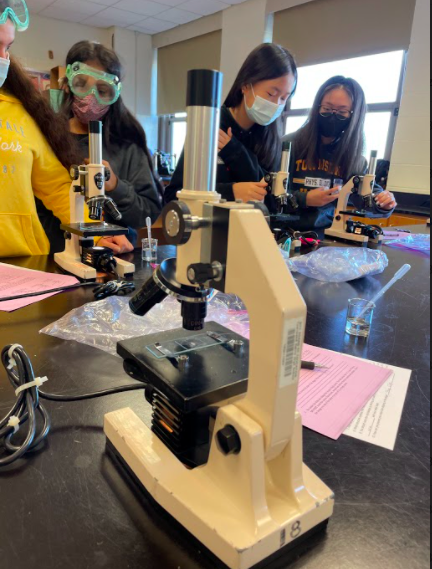
After a school year of virtual club meetings, the STEM-based extracurriculars of Townsend Harris are now back to fully in-person activities. STEM club leaders and members at THHS share their thoughts on transitioning from virtual to in-person, the progress being made in their clubs, and what they hope to accomplish by the end of this year.
Quantum Matrix and (E)ST(E)EM
Quantum Matrix is an astrophysics club, covering topics such as quantum computing, amateur astronomy, and other areas in modern physics. Members, also known as “Quantumplators,” are able to network with various professors and researchers in relevant professions.
President of both the Quantum Matrix and (E)ST(E)EM club, senior Jasmine Palma (and Classic editor) reflects on the current state of both clubs, as well as the effect the pandemic has had on them. For Quantum Matrix, “We’re a pretty niche club, so it’s expected that our numbers will be limited in comparison to some of the larger clubs in the school. Nevertheless, we have a lot of fun with one another and it gives us more flexibility to explore members’ individualized interests in our meetings,” Jasmine said.
Some fun hands-on projects and ideas they are working on currently include the possibility of creating 3D models of certain areas of “topographical interest.” “For instance, one of our members suggested Olympus Mons on Mars, the biggest volcano in the solar system. There’s also the Disney crater on Mercury, superimposed by additional impact craters which make it look like Mickey Mouse. We might also schedule some outings, such as lab tours or star-gazing nights,” Jasmine concluded.
(E)ST(E)EM is a club dedicated to coding where members join hackathons, build websites and take part in other coding projects. Jasmine said, “For (E)ST(E)EM, being in-person allows us to actively check up on our members’ progress. We meet in the computer lab, so while teaching our members some new coding concepts, we can easily walk up to them and help them through any difficulties. It was very difficult to do that when we were remote since members had to put their code into the Zoom chat.”
In regards to the benefits of being in person over virtual, Jasmine also stated, “It’s also just nice being around one another. Movies sometimes make programmers to be these solitary socially awkward nerds who spend their time alone in a dark room hunched over their keyboards, eyes wide and bloodshot from staring at their computer screens for too long. However, coding itself is a very collaborative activity. I put on music while everyone’s busy coding, chatter sometimes melting into the clacking sound of the keyboards.”
ModIt
ModIt is “an interactive community focused on teaching, learning, and applying computer science and engineering skills,” according to the Extracurricular Database.
President of ModIt, senior William Olsen, discussed how the club is doing so far: “Things like the delivery of lessons and helping our members first learn what they need to have been going alright. However, for the parts of our club that aren’t related to coding, the drop of members has resulted in less attention to an otherwise interesting and enriching area of our club.”
He explained how quarantine differed from how it is now and said, “During quarantine, we were not as able to personally work with and help each of our members in the club due to the functional limitations of Zoom meetings (i.e. equal attention at all times, no side conversations), but now, we are not only able to help out our members better but get to know them easier as well.”
Photo by Aurelia Liu




























